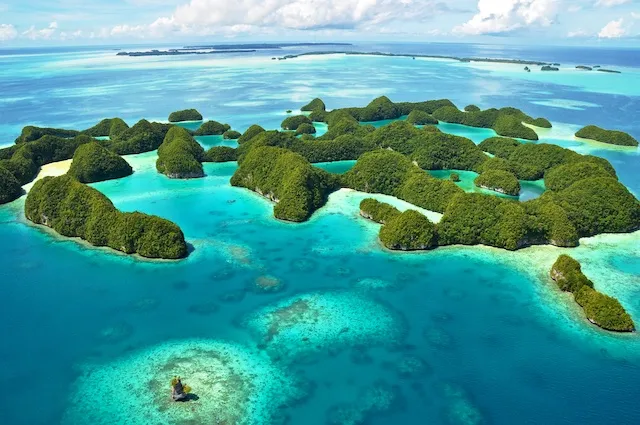
Pacific Islands and the Climate Crisis: Challenges, Injustices, and Pathways Forward

LONDON, UNITED KINGDOM, November 29, 2024 /EINPresswire.com/ -- The Pacific Islands, some of the most vulnerable regions to climate change, have once again found themselves overlooked on the global stage. As COP29 concluded in Baku, Azerbaijan, climate advocates from the Pacific expressed profound disappointment, highlighting both the inadequacy of global commitments and the systemic inequities in addressing the climate crisis.
COP29: Missed Opportunities and Systemic Failures
The Pacific Islands Climate Action Network (PICAN) sharply criticized COP29, labeling it a "catastrophic failure." While the summit was framed as the "Finance COP," a pivotal moment to address climate finance gaps, it fell woefully short. Developed nations pledged $300 billion annually by 2035—a figure far below the $1 trillion demanded by developing nations. Worse, the pledge relied heavily on loans rather than grants, exacerbating the debt burdens of vulnerable nations.
Trevor Williams, coordinator of the Vanuatu Climate Action Network, described the failure as a deliberate erosion of equity principles enshrined in the Paris Agreement. "Developed nations dismantled their responsibility," he stated, citing the lack of commitment to fossil fuel phase-outs and insufficient Nationally Determined Contributions (NDCs). The weakened Loss and Damage fund and the rollback of Just Transition principles further underscored the neglect of frontline communities.
For Pacific nations like Tuvalu and Kiribati, the consequences are personal. Rising sea levels, extreme weather events, and the erosion of cultural heritage continue to threaten their existence. “Every fraction of a degree in warming translates into lost lives and homelands,” said Tuvalu’s Richard Gokrun.
Australia’s Role in the Pacific’s Climate Struggles
Adding to the Pacific’s grievances is Australia’s stance on fossil fuels. As one of the world’s largest fossil fuel exporters, Australia’s plans to expand its gas industry drew sharp criticism. Pacific leaders, including Ralph Regenvanu of Vanuatu, accused Australia of "exporting climate destruction" while professing support for Pacific nations on the global stage.
Tuvalu’s climate minister, Maina Talia, stressed the necessity of limiting global warming to 1.5°C, calling it a "lifeline" for Pacific communities. Talia’s comments highlight the dual expectations from Australia: to phase out fossil fuels and to meaningfully contribute to climate finance. However, Australia’s current commitments were rated as “insufficient” by Climate Action Tracker, reflecting a gap between rhetoric and action.
Structural Inequities in Climate Finance
A recent Pacific Ocean Climate Crisis Assessment (POCCA) revealed deep flaws in the global climate finance system. With funds funneled through institutions like the World Bank and IMF, an alarming 72% of climate finance comes in the form of loans. This dynamic benefits private contractors in developed nations while saddling Pacific countries with unsustainable debt.
The Pacific Islands already face climate-related costs of $141 billion annually, a figure projected to rise to $1 trillion by 2030. Despite the establishment of a Loss and Damage fund at COP28, its operationalization remains opaque, with little indication that it will meet the needs of Pacific communities.
Indigenous Knowledge: A Pillar of Resilience
Despite the challenges, Pacific communities have demonstrated remarkable resilience. For centuries, they have relied on Indigenous knowledge to adapt to environmental challenges. Traditional elevated housing, coastal vegetation management, and community-driven relocation strategies illustrate their ingenuity.
Fiji’s use of native vegetation for coastal protection and French Polynesia’s government-subsidized elevated housing showcase how blending Indigenous practices with contemporary science can bolster resilience. These approaches emphasize community agency, countering the prevailing narrative of Pacific vulnerability.
A Call for Justice and Equity
The Pacific Islands’ demands are clear: climate finance must be grants-based, fossil fuel phase-outs must accelerate, and adaptation strategies must center on Indigenous knowledge. Pacific leaders and scholars advocate for a transformative shift in climate negotiations—one that prioritizes equity and justice over performative pledges.
As the world grapples with the intensifying climate crisis, the Pacific’s message is unmistakable. "Our future lies solely in the hands of industrialized nations," Talia asserted. The global community must rise to the occasion, ensuring that the voices of those on the frontlines are no longer silenced but amplified and acted upon.
Marina Jones
Asia Pacific Insight
info@asiapacificinsght.com
Distribution channels: Culture, Society & Lifestyle, Energy Industry, Environment, Healthcare & Pharmaceuticals Industry, International Organizations
Legal Disclaimer:
EIN Presswire provides this news content "as is" without warranty of any kind. We do not accept any responsibility or liability for the accuracy, content, images, videos, licenses, completeness, legality, or reliability of the information contained in this article. If you have any complaints or copyright issues related to this article, kindly contact the author above.
Submit your press release